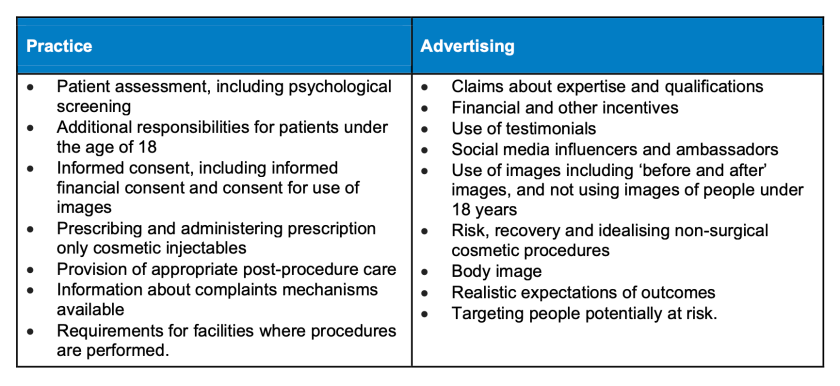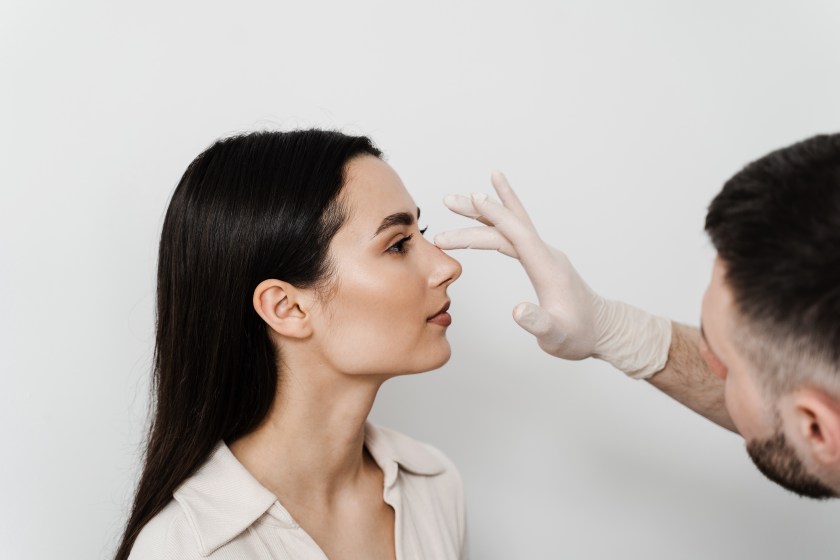Have your say about the new regulations until February.
Yesterday, AHPRA published a 55-page document including new proposed guidelines for Australia’s non-surgical cosmetic procedures sector, expanding an ongoing overhaul of the nation’s cosmetic surgery industry. While the previously released guidelines for cosmetic surgery and non-surgical cosmetic treatments, which came into effect on July 1 this year, were aimed at medical professionals, the new proposed guidelines include health professionals and have a specific section for nurses.
Members of the public, practitioners and other stakeholders have until 2 February 2024 to make submissions on the following guidelines:
- Draft Guidelines for nurses who perform non-surgical cosmetic procedures (nurses practice guidelines)
- Draft Guidelines for registered health practitioners who perform non-surgical cosmetic procedures(shared practice guidelines) (excluding medical practitioners who are already subject to the MBA’s Guidelines for registered medical practitioners who perform cosmetic surgery and procedures)
- Draft Guidelines for registered health practitioners who advertise non-surgical cosmetic procedures(advertising guidelines).
The new guidelines cover increasingly popular dental procedures (such as porcelain veneers) undertaken for cosmetic purposes, with patients and practitioners being warned they are not without risks. They also address nurse practitioners, enrolled nurses, and registered nurses about their duties in performing and advertising injectable treatments, classified by AHPRA as ‘non-surgical cosmetic procedures’.

The cosmetic treatment industry estimates Australians collectively spend more than one billion dollars a year on non-surgical procedures ranging from anti-wrinkle injections and fillers to fat dissolving injections and thread lifts performed by doctors, nurses, dentists and other health practitioners.
‘Getting these services is not like getting a haircut – these procedures come with risk. We want to ensure the public knows what safe practice looks like, and that practitioners are doing everything necessary to keep the public safe,’ Ahpra CEO Martin Fletcher said.
The new proposed guidelines place a stronger emphasis on informed consent and pre-procedure consultation, including a patient suitability assessment. There will also be a focus on prescribing and administering prescription-only cosmetic injectables.
Proposed new advertising guidelines focus on the use of ‘before and after’ images, claims about expertise and qualifications of practitioners, and affirm the ban on the use of testimonials. There are also clear rules on the use of influencers and social media figures.
We asked consumer and work advocate Michael Fraser, who also co-hosts the newly launched podcast Surgery Secrets: Beauty’s Dark Side, for his thoughts on AHPRA’s new guidelines. “We and others advocated for these guidelines to be brought in for both cosmetic surgery and procedures. A crackdown was needed,” he told us.

“The draft guidelines for advertising are potentially world leading, make it clear that advertising must not be done in a way that exploits vulnerabilities or insecurities to increase demand for procedures,” he continued. “Practitioners will need to include their qualifications and registration number in all advertising. Advertising must not use terms that may mislead or create unrealistic expectations. Examples of inappropriate terms in the guidelines are sculptor, god, king, queen, master, world renowned etc. Imagery that includes music, dancing, singing, or comedic comments when advertising will be in the spotlight too.”
“Industry needs to remember that AHPRA now actively monitor advertising and much of the non-surgical cosmetic procedures advertising already falls well short of the current standard expected. The use of emojis and sexualised images will also be in focus. As well as words like gentle, simple, safe, quick, easy, barbie, more masculine, feminine appearance, perfect and similar.”
Indeed, advertising is a big focus in AHPRA’s new proposed guidelines, and, according to Michael, this is long overdue.
“Advertising in the cosmetic procedure space is out of control. Medical procedures are being marketed as beauty treatments. Every day we observe many breaches of the law and the concerning conduct of registered health practitioners and others don’t call them out. Instead they share this content and invite them to speak on panels and train others. This is conduct that was never acceptable when they trained as medical professionals. Marketing and making videos with the team are the focus of the day and their targets are people, often young women who are vulnerable and suffering from low self esteem,” Michael explains, elaborating that he would like to see the words ‘normal’ and ‘natural’ added to the list of banned words.
“Unless you are born with a congenital abnormality, you are normal, we all are. More and more studies are showing the harm this type of messaging does to people, especially young woman and in an upcoming episode of our podcast we explore the impact with a body image researcher. Her words to the non-surgical cosmetic procedures industry is to stop advertising on social media.”
Feedback submissions can be made via an online survey or using the template provided and emailing to AhpraConsultation@ahpra.gov.au. Both methods pose the same specific questions for feedback as well as an opportunity for additional comments. You only need to submit via one method. Note that you need to clearly state if you don’t want your feedback to be made public. Submissions close on February 2, 2024.
You can read the proposed new guidelines here.
There are 5 ways you can catch up with SPA+CLINIC
- Our quarterly print magazine, delivered to your door. Subscribe here.
- Our website, which is updated daily with its own completely unique content and breaking news.
- Our weekly newsletter – free to your inbox! Subscribe here.
- Our digital magazine – click here to view previous issues.
- Our social media – see daily updates on our Instagram, Facebook & Linkedin




